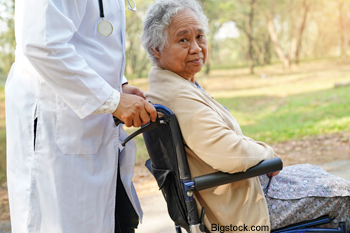Outdoor activities, massage may be more effective in some cases than medication to treat aggression and agitation in patients with dementia, study suggests

By Ana Gajic

For patients with dementia who have symptoms of aggression and agitation, interventions such as outdoor activities, massage and touch therapy may be more effective treatments than medication in some cases, suggests a study publishing Oct. 14 in Annals of Internal Medicine.
The systematic review and meta-analysis, led by St. Michael’s Hospital of Unity Health Toronto and the University of Calgary, suggest outdoor activities were more clinically effective than anti-psychotic medication for treating physical aggression in patients with dementia. For patients with physical agitation, massage and touch therapy were more efficacious than usual care or caregiver support.
“Dementia affects 50 million people worldwide and as many as three quarters of those living with the disease have reported neuropsychiatric symptoms including aggression, agitation and anxiety,” said Dr. Jennifer Watt, a researcher at the Li Ka Shing Knowledge Institute of St. Michael’s Hospital.
“Unfortunately, our understanding of the comparative efficacy of medication versus non-medicine interventions for treating psychiatric symptoms has been limited due to a lack of head-to-head randomized controlled trials of the two routes.”
To address this gap, researchers led by Dr. Watt, who is also a geriatrician; Dr. Sharon Straus, director of the Knowledge Translation Program at St. Michael’s; and Dr. Zahra Goodarzi, a geriatrician and researcher at the University of Calgary, worked with 12 dementia care partners to select study outcomes based on commonly reported neuropsychiatric symptoms of the disease. They identified reports of improvement in aggression and agitation to be the main two outcomes to focus on in the analysis and review.
The study’s findings are based on an analysis of 163 randomized controlled trials involving 23,143 people with dementia and the study of pharmacologic or non-pharmacologic interventions to treat aggression and agitation.
Though the study allows for the comparison of the two types of interventions, the researchers point out that neuropsychiatric symptoms of dementia do not have a one-size-fits-all solution.
“Treatment should be tailored to the patient and their specific experience,” said Dr. Straus, who is also a geriatrician at St. Michael’s. “This study, however, does shed light on the opportunity to consider prioritizing different types of interventions for aggression and agitation when appropriate.”
Further research, Dr. Watt said, will aim to understand the influence of individual patient characteristics on their response to interventions. The researchers also note the need for an analysis of the differences in cost between pharmacologic and non-pharmacologic interventions to treat aggression and agitation in patients with dementia.
“This study shows us that multidisciplinary care is efficacious, and that is consistent with a person-centred approach to care,” Dr. Watt said. “It points to evidence of the benefit of supporting multidisciplinary teams providing care to patients in the community and nursing home settings.”
This paper is an example of how St. Michael’s Hospital is making Ontario Healthier, Wealthier, Smarter.
About St. Michael’s Hospital
St. Michael’s Hospital provides compassionate care to all who enter its doors. The hospital also provides outstanding medical education to future health care professionals in more than 27 academic disciplines. Critical care and trauma, heart disease, neurosurgery, diabetes, cancer care, care of the homeless and global health are among the Hospital’s recognized areas of expertise. Through the Keenan Research Centre and the Li Ka Shing International Healthcare Education Centre, which make up the Li Ka Shing Knowledge Institute, research and education at St. Michael’s Hospital are recognized and make an impact around the world. Founded in 1892, the hospital is fully affiliated with the University of Toronto.
About Unity Health Toronto
Unity Health Toronto, comprised of Providence Healthcare, St. Joseph’s Health Centre and St. Michael’s Hospital, works to advance the health of everyone in our urban communities and beyond. Our health network serves patients, residents and clients across the full spectrum of care, spanning primary care, secondary community care, tertiary and quaternary care services to post-acute through rehabilitation, palliative care and long-term care, while investing in world-class research and education. For more information, visit www.unityhealth.to.
